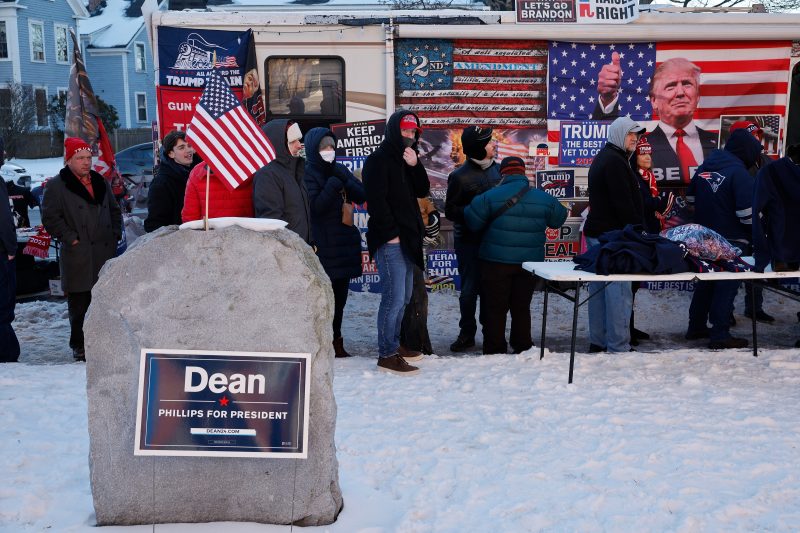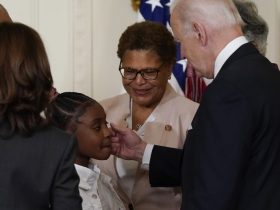New Hampshire is hosting the first-in-the-nation primary election Tuesday night, and while this year’s contest comes with a few caveats for Democrats, on the Republican side, the election is expected to run the same way it has for decades.
2024 presidential election
1/5
End of carousel
Polls in the state start to close at 7 p.m. Eastern, with the last closing at 8 p.m.
Here’s how the New Hampshire primary will unfold:
Per the Associated Press, during the 2020 New Hampshire primary, the first results were posted around 12:15 a.m. Eastern — these were results from the small New Hampshire town of Dixville Notch, which opens polls at midnight Eastern and closes them soon after, when its handful of residents have cast a vote. The larger set of GOP results in 2020 were first reported around 7:30 p.m. Eastern, moments after the first polls closed. Vote tabulations during that primary night ended around 1:15 a.m. Eastern.
Results of the New Hampshire Republican primary will dictate how many of the state’s 22 delegates will be allocated to each candidate. Per state rules, a candidate must receive at least 10 percent of the vote to receive delegates, and any unallocated delegates are assigned to the candidate who finishes first statewide. This year, the election will work a little differently for Democrats because candidates will not receive delegates based on the results of their primary.
In New Hampshire, registered Republicans and Democrats may only vote in their party’s primary, while independent or unaffiliated voters may vote in either the Democratic or Republican primary.
In the Republican primary, the AP — whose projected winners news outlets, including The Washington Post, rely on for reporting results — said it will analyze early result returns and “compare them with past election results, which may help determine whether early returns are providing a clear indication of the winner.” The AP says it will declare a winner in the GOP primary, as well as a second-place finisher, “only when it’s determined there is no scenario that would allow the trailing candidates to close the gap.”
All 24 Republicans who mounted a bid for their party’s nomination will appear on the ballot — even if they have already dropped out of the race, a list that includes former New Jersey governor Chris Christie, biotech entrepreneur Vivek Ramaswamy and, most notably, Florida Gov. Ron DeSantis — who dropped out of the race on Sunday.
While former president Donald Trump has led the polls in the state since the beginning of the race, the election is crucial for former U.N. ambassador Nikki Haley, who has polled a strong second in the state behind her former boss. Haley, Trump’s last remaining competitive challenger in the Republican Party, has high hopes the more moderate electorate in New Hampshire will invigorate her campaign and slow the former president’s momentum ahead of another key primary — the one in her home state of South Carolina.
Trump is favored to win the primary, which would repeat a feat he pulled off in 2016 — which was then a more competitive field. That year, Trump defeated Ohio Gov. John Kasich in the primary after receiving 35 percent of the vote. Kasich received less than half of that — 15 percent — and the race’s other early favorites, Sen. Ted Cruz (R-Tex.), former Florida Gov. Jeb Bush and Sen. Marco Rubio (R-Fla.) received about 10 percent of the vote each.
With President Biden opting to stay off the ballot because the timing of the New Hampshire primary violates Democratic National Committee rules, and supporters of the president encouraging voters to write in his name on Tuesday, getting the results of the Democratic primary may take a little longer than the Republican race.
The AP is expected to report vote results for all 21 Democratic candidates on the ballot — including Rep. Dean Phillips (D-Minn.) and self-help author Marianne Williamson — as well as those marked as “unprocessed write-in.” Per the AP, once those unprocessed write-in ballots are processed, they will be classified as either “Joe Biden write-in” or “Other write-in.” Because those ballots have to be reviewed one-by-one, the vote-counting process may take longer than usual — with a call in the Democratic race not expected until Wednesday.
New Hampshire Secretary of State David Scanlan told reporters in October that the count of write-in votes is “going to be some extra work,” but he noted that his office has spent months preparing for it.
“It sounds like it would be a big job, but you have to remember, it is one race where it is ‘vote for one,’ and it’s fairly easy to sort through the ballots,” he said.








